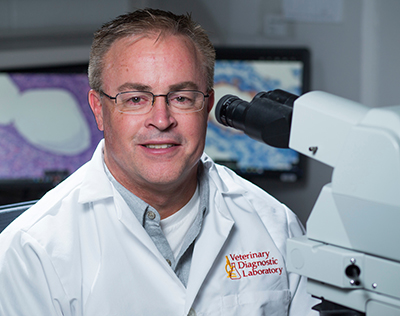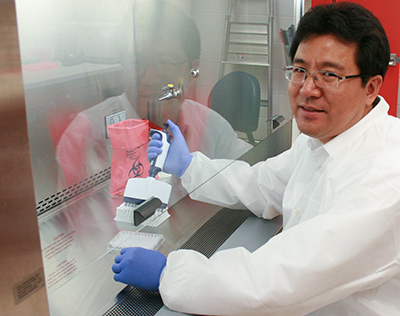

It’s not often that a fellowship established at a veterinary school honors the accomplishments of a faculty member at another vet college.
Yet that’s what Pipestone Veterinary Services did when the company established the MorriSTONE Faculty Fellowship in honor of Dr. Bob Morrison of the University of Minnesota. Morrison was instrumental in the lives of many of Pipestone’s swine veterinarians’ personal and professional growth.
The initial awardee of the fellowship utilized the funds to help advance swine medicine at Iowa State.
“We used the fellowship to support a PhD graduate student and post-doctoral staff whose research involved bioinformatics analysis of influenza A viruses circulating in swine and describing the genetic and antigenic diversity that has affected the ability to control the virus with biosecurity methods and current vaccines,” said Dr. Phil Gauger, associate professor of veterinary diagnostic and production animal medicine.
Gauger said through this research, influenza monitoring in swine was automated using data in the Veterinary Diagnostic Laboratory information management system.
“This provides a method of surveillance for emerging or novel strains of influenza in swine,” Gauger said.
Additional studies involving the graduate student and post-doc looked at detecting human influenza A viruses that spill over into swine and documenting evidence of reassortant viruses that contained gene segments from a live attenuated influenza virus vaccine that started to circulate in swine after the release of the vaccine for commercial use.
Influenza A virus is common in swine, but difficult to control due to widespread circulation of the virus and increasing genetic and antigenic diversity. This reduces the ability of current vaccines to cross-protect against multiple strains.
The research conducted with funding from the MorriSTONE Fellowship was used to support an additional grant Gauger and his team received from the Defense Advanced Research Projects Agency. The project is an extensive evaluation of the evolution, genetic and antigenic changes that occur in influenza A viruses in swine.
“The research investigates how virus evolution, reassortment and genetic changes affect vaccine antigen selection that could help improve cross-protection in swine,” Gauger said. “We will also evaluate influenza A virus genetic changes that may enhance transmission of the virus among swine or cause occasional zoonotic infections observed in people.”
Gauger has concluded his term as the MorriSTONE Faculty Fellow and now the position has been awarded to Dr. Jianqiang Zhang, associate professor of veterinary diagnostic and production animal medicine. Like Gauger, Zhang’s research project focus on swine medicine.
Zhang’s current research looks at porcine enteric coronaviruses and porcine reproductive and respiratory syndrome virus (PRRSV). He plans to use the MorriSTONE Fellowship funding to support one PhD graduate student and develop and validate diagnostic tools in hopes of better detecting and differentiating commercial PRRSV-2 modified live virus vaccines.
There are currently six commercial modified live virus vaccines derived from PRRSV-2 strains available in the U.S. The current screening PCR cannot differentiate PRRSV-2 vaccine viruses from other strains.
“We plan to develop and validate new diagnostic tools to better address this challenge and better serve the swine industry,” Zhang said.
When PRRSV is isolated from a farm, guidance on which vaccine(s) to use against the particular isolate is lacking. Zhang is also considering looking at the generation of antisera against commercial PRRSV-2 modified live virus vaccines. He will evaluate their in vitro cross neutralization against genetically diverse PRRSV laboratory and field isolates. These will ultimately help veterinarians and producers select appropriate PRRSV vaccine(s) to combat PRRS under each circumstance.
November 2020
